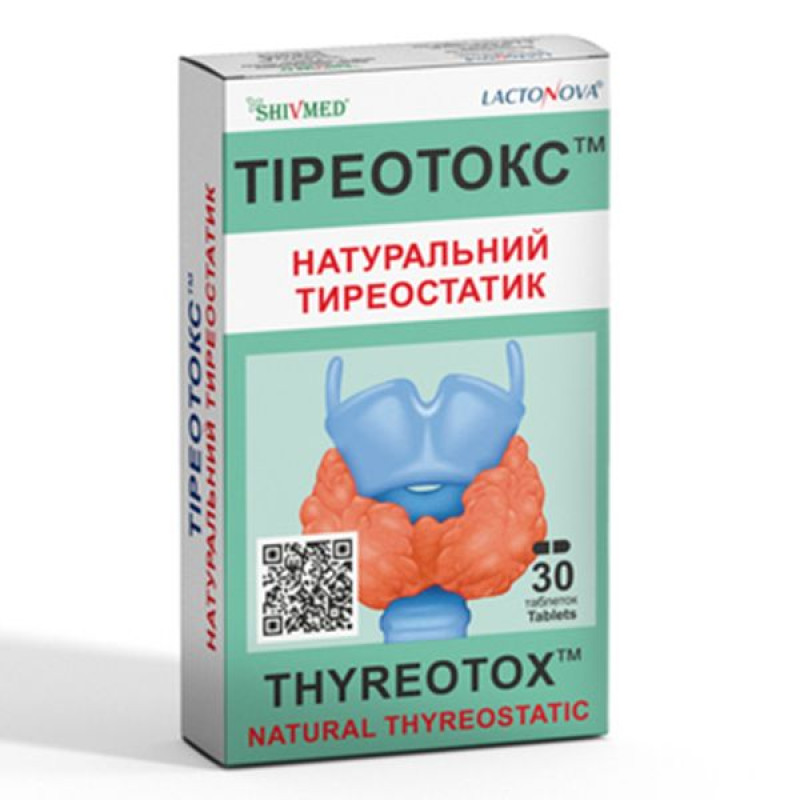Thyrotox tablets No. 30

A nutraceutical that helps eliminate the manifestations of thyroid hyperfunction, normalize the functional activity of the thyroid gland and balance its hormones.
Composition
Lycopodium europaeus extract, Acetyl-L-carnitine arginate, Melissa officinalis extract, Leonuri cardiaca extract, Crataegus laevigata extract, Vitamin D3
Pharmacological properties
THYROTOX helps eliminate clinical symptoms in people with conditions caused by elevated levels of thyroid hormones, in particular those associated with hyperthyroidism. The complex of biologically active substances has a thyrostatic effect due to the normalization of iodine metabolism and inhibition of iodine transport in the thyroid gland, as well as by inhibiting the process of enzymatic deiodination of thyroxine outside the thyroid gland. Thyrotox suppresses excessive synthesis of TSH and blocks the attachment of TSH to receptors, and also inhibits the synthesis and secretion of T4 by reducing the stimulation of thyroid cells caused by TSH. Inhibits the processes of conversion of T4 to T3. Enhances the excretion of T4 in the urine by increasing the rate of glomerular filtration and interfering with the resorption of T4 by the kidneys. Thyrotox is a peripheral antagonist of the action of thyroid hormones, due to the action of L-carnitine on reducing the penetration and inhibition of the action of thyroid hormones in the nuclei of hepatocyte cells, neurons, and fibroblasts.
The active form of vitamin D – calcitriol – inhibits the synthesis of antibodies to the TSH receptor (anti-rTSH), promoting remission of the disease; and also inhibits the ability of autoantibodies to bind to TSH receptors. Thyreotox acts as a natural beta-blocker, helping to reduce the manifestations of neurovegetative disorders and heart rate.
The high level of clinical effectiveness of THYREOTOX is due to the pharmacological effects and synergism of the active components that make up its composition.
European yarrow contains flavonoids, tannins, organic acids, cardiac glycosides. Yarrow has a pronounced thyreostatic effect due to inhibition of iodine transport in the thyroid gland. Yarrow inhibits the synthesis and secretion of T4 by cells of the follicular epithelium of the thyroid gland. It also reduces T3 levels by inhibiting the conversion of T4 to T3. Lithospermic acid reduces the excitability of the thyroid gland, normalizes iodine metabolism, and prevents the production of excess thyroid hormones. Rosmarinic acid slows down the stimulation of thyroid cells caused by TSH by inhibiting adenylate cyclase. Rosmarinic acid forms bonds with endogenous TSH, thereby reducing its ability to bind TSH receptors, which contributes to a decrease in thyroxine production. Yarrow also inhibits the ability of autoantibodies in Graves' disease to bind to TSH receptors. Thyme increases urinary T4 excretion by increasing glomerular filtration rate and interfering with renal T4 reabsorption. Thyme glycosides help reduce heart rate, nervousness, improve mood, and increase performance.
Acetyl-L-carnitine arginate is involved in the normalization of protein and fat metabolism, helps reduce elevated basal metabolism in thyrotoxicosis, restores the alkaline reserve of the blood. An important effect of L-carnitine in hyperthyroidism is to prevent the penetration of thyroxine and triiodothyronine into the cell nucleus, which is a necessary condition for the manifestation of symptoms of thyrotoxicosis. L-carnitine inhibits the action of thyroid hormones in the nuclei of cells of some tissues (hepatocytes, neurons and fibroblasts) and thus is a peripheral antagonist of the action of thyroid hormones. L-carnitine is effective in hyperthyroidism associated with Graves' disease, autoimmune thyroiditis and multinodular goiter.
Lemon balm, due to its flavonoid and polyphenol content, inhibits excessive TSH production, blocks the binding of thyroid-stimulating hormone (TSH) to receptors, blocks T4 synthesis, and prevents the conversion of T4 to T3 in peripheral tissues. Lemon balm, having the ability to affect the reduction of hormonal levels and potentiate the effect of antithyroid drugs, can be used in the complex therapy of Graves' disease, as well as in the elimination of symptoms of thyrotoxicosis.
Due to the content of a number of alkaloids, glycosides, flavonoids (rutin, quercetin), and saponins, stinging nettle acts as a natural beta-blocker and is therefore effective in hyperthyroidism and thyrotoxicosis to relieve a specific symptom complex (tachycardia, nervous excitement, depression, insomnia).
Vitamin D3 - is an integral part of the influence on the pathogenesis and course of autoimmune thyroid diseases. Vitamin D reduces the titers of antithyroid antibodies in patients with autoimmune thyroid pathology (Graves' disease and Hashimoto's thyroiditis), especially against the background of its deficiency. Vitamin D helps to reduce the duration of the thyrotoxic phase of Hashimoto's thyroiditis. Normalization of vitamin D levels reduces the risk of recurrence of Graves' disease, especially during the withdrawal of antithyroid drugs. The mechanism underlying this effect is that its active form - calcitriol - inhibits the synthesis of antibodies to the TSH receptor (anti-pTSH), contributing to the remission of the disease. Vitamin D appears as a protective factor against the recurrence of Graves' disease.
Indications for use
- Conditions caused by elevated levels of thyroid hormones, particularly those associated with hyperthyroidism.
- As part of complex therapy for thyrotoxicosis to enhance the effect of thyreostatics.
- Subclinical thyrotoxicosis without indications for thyreostatic therapy.
- To prevent "withdrawal syndrome" when stopping taking thyreostatics.
- Vegetative manifestations of thyroid hyperfunction.
Method of application
Adults 1 tablet 3 times a day during or after meals. The duration of use is 3 months, then as agreed with the doctor. Maintenance and preventive dose - 1 tablet 1 time a day. It is recommended to consult a doctor before taking.
Contraindication
Hypothyroidism, childhood, pregnancy, lactation and individual intolerance to the components of the drug. When used in recommended doses, no side effects have been identified.
Application features
Joint administration with thyreostatics is allowed only under the supervision of a physician.
Release form
30 tablets (2 blisters of 15 tablets).
There are no reviews for this product.
There are no reviews for this product, be the first to leave your review.
No questions about this product, be the first and ask your question.



